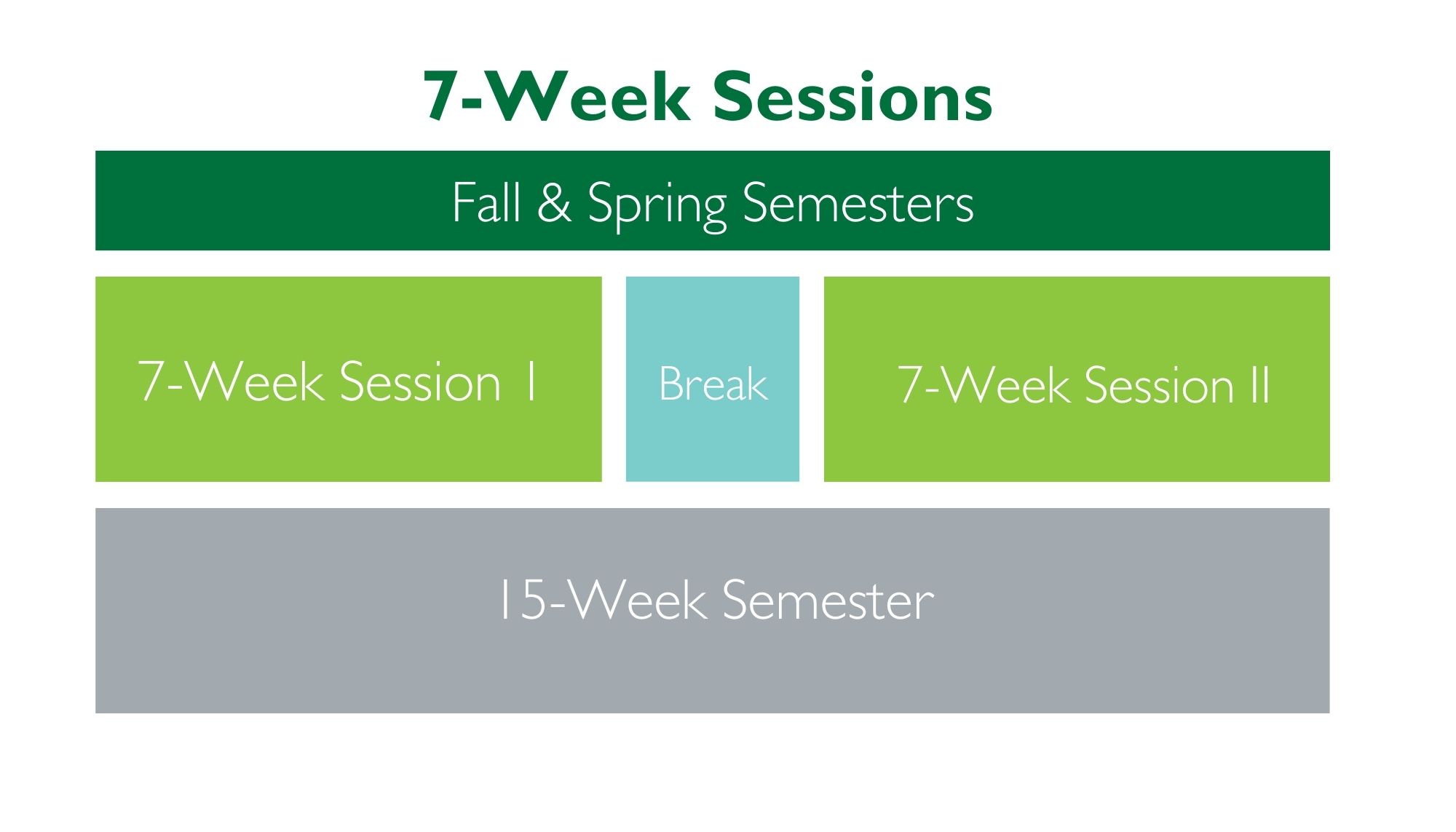7-Week Sessions
Students have more complex lives than ever before. Many work while attending school and want greater flexibility while balancing life and classes. Taking fewer courses for shorter periods of time, combined with continuous enrollment, helps students stay enrolled, maintain momentum and complete successfully. A 7-week session schedule can enable students to begin and finish courses more quickly, leading to more timely completion of their degree.

Frequently Asked Questions
View a printable version of the 7-Week Sessions FAQ here.
A 7-week session breaks the standard 15-week semester into two terms that are 7 weeks (about 1 and a half months) each. 7-week sessions offer the same quality of teaching, support, and content as traditional semester-long classes, in a shorter time. In these classes, students can focus on fewer classes at once, allowing for full immersion in course material. Because 7-week sessions increase the number of weekly class hours and workload across a shorter period, full-time students need to consider how to best balance their schedules.
One of the primary advantages of 7-week sessions is that students can focus on fewer classes at once. Additionally, research has shown that students in 7-week sessions have higher class success rates and higher completion rates. Students enrolled in 7-week sessions have a one-week break between sessions, creating on- and off-ramps for decompressing between courses.
Sometimes a personal emergency may cause a disruption in a student’s schedule. This often means they lose momentum and credit while they wait for the next semester to begin. Students who decide to drop a course in a 7-week session no longer need to wait a whole semester before registering for another class and they can get back on track faster.
-
Enhanced focus. Students who take 7-week classes are immersed in subject matter, focusing on fewer classes at a time. A tighter focus increases motivation, concentration, and participation which leads to better retention of material.
-
Build momentum. In a 7-week session, classes cover the same material as a traditional semester in half the time. Students who complete a course within a shorter time period experience a feeling of increased momentum, which motivates them to persist toward class and program completion.
-
Achieve goals faster. 7-week sessions enable students to complete classes more quickly, decreasing the time it takes to complete their program.
-
Time management. Students who take 7-week classes often experience increased work-life balance, even when taking a full load. Instead of focusing on four or five classes throughout the semester, they only concentrate on two or three at a time allowing students to adapt their schedules to their needs.
-
Improved outcomes. Colleges and universities have seen students succeed at a higher rate with 7-week classes. This means students are more likely to stay on track until graduation!
Yes, tuition will stay the same as the same class offered in a different format.
Financial aid will still be processed for the fall, spring, and summer terms. However, you will need to make certain to register for all your semester courses upfront. This means if you plan to take courses in the first 7-week session and the second 7-week session, you must enroll for all classes prior to the last day to drop classes for the 15-week semester.
Find the full Academic Calendar here.
You will register for full semester, 7-Week Session I, and 7-Week Session II classes at the same time during the normal semester registration period.
All three formats - hybrid, online, in-seat - will be offered in 7-weeks.
Every student has their own unique learning style. The 7-week format will provide a more intense, concentrated experience, which is known to enhance understanding and retention of class material. While this format may not suit every student's preferences, it presents an opportunity to explore a different learning modality that could potentially enhance your educational experience. We encourage you to carefully consider your individual learning style and academic goals when deciding whether the 7-week session aligns with your needs.
Careful mixing and matching of both 7- and 15-week classes is okay but should be done with thoughtful planning and a conversation with your Student Success Coach. Remember the total number of credits a student can take during the entire semester is 18.
You can change your schedule before the add/drop deadline. Keep in mind if you need to maintain full-time status for a program like the Rhode Island Promise Scholarship, changing your schedule may impact your eligibility. This is also true for students who need to maintain half-time status for student loan eligibility. It is always best to check with Financial Aid to determine the impact before you make changes.
If you are using financial aid, we advise that students enroll in both sessions at once. You should contact your academic Student Success Coach or financial aid Student Success Coach.
Veteran students receiving Post-9/11 GI Bill benefits (Chapter 33) receive a monthly stipend to help cover housing book costs while enrolled in school. This is called the Basic Allowance for Housing (BAH). BAH payments are based on "training status" (credits) and the number of weeks per session so taking 7-week classes will potentially impact payment rates. Please email [email protected] if you have questions about how this may impact your payments.
We encourage you to reach out to your Student Success Coach if you have any questions regarding your academic schedule. You can find out how to connect with your Student Success Coach through your Starfish account or you can email the Advising Center at [email protected].